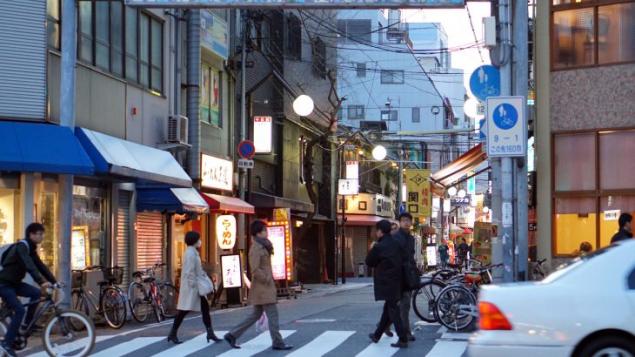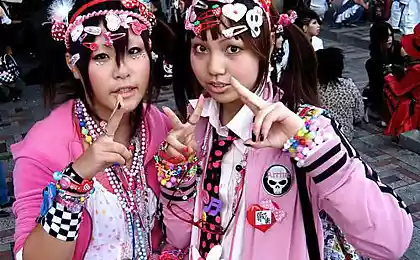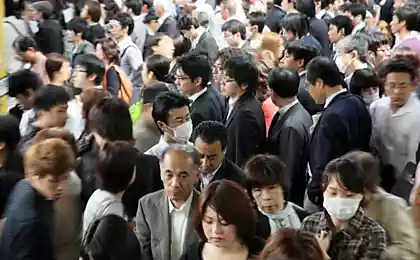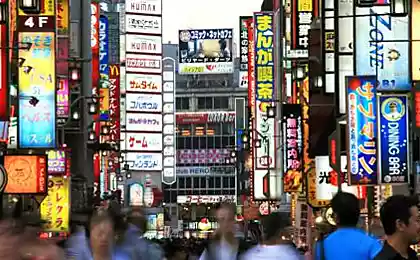622
To survive at all costs: 20 facts about how the Japanese work
The Japanese are known for being very hard working and organized workers. However, their working system and the daily routine can seem terribly inhuman... And it is really so, because the Japanese work literally wear! The website shares with the reader interesting facts about what we have to go to the inhabitants of the land of the Rising Sun in the name of work.

The Japanese observe a strict dress code In Japan, most companies have introduced compulsory wearing black suit with tie for men and suit, straight silhouette with a MIDI skirt for women. Violation of this rule is punishable by dismissal.
Japanese women are forbidden to wear bright makeup to work the Japanese believe that a woman should not attract men's attention. So the weekend of a resident of Japan "rip" and painted as vividly as possible, and go to work almost without makeup, using only powder and mascara.
Men not allowed to wear beards and mustaches due to the fact that long hair, mustache and beard — a sign of belonging to the Japanese mafia, the Yakuza. Workers with long hair was forced to leave her employment.
The company's management reglamentary even hairstyles In some state-owned companies employees are prohibited from wearing long hair, they should be short and barely cover the ears. And if the nature of the girl's blonde hair, she was forced to dye my hair black.
The Japanese do not talk about personal life at work According to the rules in the workplace you can't talk about your family, about problems and other topics, because it's distracting. Even an innocent conversation about the weather and nature banned!
Can't they just finish the job and relax If the Japanese have a certain task for the day, and he completed it before the appointed time, he can't just go and, for example, coffee. The employee must remain in your seat and work until the end of the day.
The Japanese are devoting too much time to detail due to the fact that companies pay their employees for hours spent at the workplace, and not for work performed in fact, the Japanese tend to stretch even just a little errand for a long time. It is terribly slow workflow, but nobody wants to change.
They spend many hours meeting of All the fact that they are not used to speak briefly and to the point. Speaking of something Japanese, embarks on a long and lengthy explanations, even if the person didn't ask about it. The Japanese believe that if their speech on the subject are too short, they show disrespect to the interlocutor. Because of this, the meeting stretched for many, many hours.
The Japanese don't like to take responsibility If the employee was given the assignment that goes beyond his usual work, he may refuse to execute it, reassign it to another. If the employee will undertake business that was not in his jurisdiction, he may receive a reprimand.
In Japan an employee performs only its work That we have in Russia, we can easily instruct a colleague to do the job not according to his profile, if you do not have time. In Japan, employees have a clearly defined place in the workflow, so they never go beyond their authority.
To get the desired document in Japan — a huge problem to sign one piece of paper the Japanese have to spend many hours on consultation. Moreover, they are a must and just dismiss them is impossible.
The Japanese do not show their individuality in Order to properly exist in society, the Japanese are forced to hide their differences and distinctive personal qualities from all, especially from colleagues. At work, everything must be identical and indistinguishable from each other.
In fact, the Japanese are not great inventors Advertised advanced Japanese technology is a fiction. Many companies only pick up ideas from competitors and develop them, not invent something of their own.
Career in Japan is not very speed the Japanese do not appreciate the skill of the person and his age. So talented, but young special for a very long time to wait for higher working for the company for many years, while older workers will receive a larger salary for the experience.
High salary Japanese — it's fiction Yes, Japanese companies pay their workers a large sum but after the deduction of all taxes, which is nearly 30% of the salary, is given little more than a thousand dollars. In this case, young workers receive very little pay, and only after 30-40 years of work in one place they can count on a larger amount.
In Japan, there are no holidays, the Japanese do not go on vacation, to relax they have a Saturday or Sunday. Some companies offer an additional 10 days of vacation per year, but they can not be used at a time. Such a weekend break for the whole year.
The Japanese do not take sick leave Even with a high temperature or very poor health, the Japanese went to work, so he can't fined or fired.
A strict work schedule Even if the contract States that the working day lasts from 9 am to 7 PM, the Japanese definitely comes half an hour before starting work. Also it is not customary to leave work before the boss, and if he stayed in the office for a few hours, all employees will leave when the boss leaves the building — and not a minute before!
The Japanese almost every drink with their colleagues As a rule, twice a week, employees meet after work and go to the bar, where I drink a lot of alcohol. In Japan, a very positive attitude to alcohol, and its excessive use, no one is judging.
Often the Japanese to die on the job In Japan is not uncommon when an employee dies from overexertion on the job or commits suicide due to stress. In this case, colleagues of the deceased is extremely indignant if this unfortunate fact has prevented their work.
via pikabu.ru/story/kak_rabotayut_yapontsyi_2883930

The Japanese observe a strict dress code In Japan, most companies have introduced compulsory wearing black suit with tie for men and suit, straight silhouette with a MIDI skirt for women. Violation of this rule is punishable by dismissal.
Japanese women are forbidden to wear bright makeup to work the Japanese believe that a woman should not attract men's attention. So the weekend of a resident of Japan "rip" and painted as vividly as possible, and go to work almost without makeup, using only powder and mascara.
Men not allowed to wear beards and mustaches due to the fact that long hair, mustache and beard — a sign of belonging to the Japanese mafia, the Yakuza. Workers with long hair was forced to leave her employment.
The company's management reglamentary even hairstyles In some state-owned companies employees are prohibited from wearing long hair, they should be short and barely cover the ears. And if the nature of the girl's blonde hair, she was forced to dye my hair black.
The Japanese do not talk about personal life at work According to the rules in the workplace you can't talk about your family, about problems and other topics, because it's distracting. Even an innocent conversation about the weather and nature banned!
Can't they just finish the job and relax If the Japanese have a certain task for the day, and he completed it before the appointed time, he can't just go and, for example, coffee. The employee must remain in your seat and work until the end of the day.
The Japanese are devoting too much time to detail due to the fact that companies pay their employees for hours spent at the workplace, and not for work performed in fact, the Japanese tend to stretch even just a little errand for a long time. It is terribly slow workflow, but nobody wants to change.
They spend many hours meeting of All the fact that they are not used to speak briefly and to the point. Speaking of something Japanese, embarks on a long and lengthy explanations, even if the person didn't ask about it. The Japanese believe that if their speech on the subject are too short, they show disrespect to the interlocutor. Because of this, the meeting stretched for many, many hours.
The Japanese don't like to take responsibility If the employee was given the assignment that goes beyond his usual work, he may refuse to execute it, reassign it to another. If the employee will undertake business that was not in his jurisdiction, he may receive a reprimand.
In Japan an employee performs only its work That we have in Russia, we can easily instruct a colleague to do the job not according to his profile, if you do not have time. In Japan, employees have a clearly defined place in the workflow, so they never go beyond their authority.
To get the desired document in Japan — a huge problem to sign one piece of paper the Japanese have to spend many hours on consultation. Moreover, they are a must and just dismiss them is impossible.
The Japanese do not show their individuality in Order to properly exist in society, the Japanese are forced to hide their differences and distinctive personal qualities from all, especially from colleagues. At work, everything must be identical and indistinguishable from each other.
In fact, the Japanese are not great inventors Advertised advanced Japanese technology is a fiction. Many companies only pick up ideas from competitors and develop them, not invent something of their own.
Career in Japan is not very speed the Japanese do not appreciate the skill of the person and his age. So talented, but young special for a very long time to wait for higher working for the company for many years, while older workers will receive a larger salary for the experience.
High salary Japanese — it's fiction Yes, Japanese companies pay their workers a large sum but after the deduction of all taxes, which is nearly 30% of the salary, is given little more than a thousand dollars. In this case, young workers receive very little pay, and only after 30-40 years of work in one place they can count on a larger amount.
In Japan, there are no holidays, the Japanese do not go on vacation, to relax they have a Saturday or Sunday. Some companies offer an additional 10 days of vacation per year, but they can not be used at a time. Such a weekend break for the whole year.
The Japanese do not take sick leave Even with a high temperature or very poor health, the Japanese went to work, so he can't fined or fired.
A strict work schedule Even if the contract States that the working day lasts from 9 am to 7 PM, the Japanese definitely comes half an hour before starting work. Also it is not customary to leave work before the boss, and if he stayed in the office for a few hours, all employees will leave when the boss leaves the building — and not a minute before!
The Japanese almost every drink with their colleagues As a rule, twice a week, employees meet after work and go to the bar, where I drink a lot of alcohol. In Japan, a very positive attitude to alcohol, and its excessive use, no one is judging.
Often the Japanese to die on the job In Japan is not uncommon when an employee dies from overexertion on the job or commits suicide due to stress. In this case, colleagues of the deceased is extremely indignant if this unfortunate fact has prevented their work.
via pikabu.ru/story/kak_rabotayut_yapontsyi_2883930























